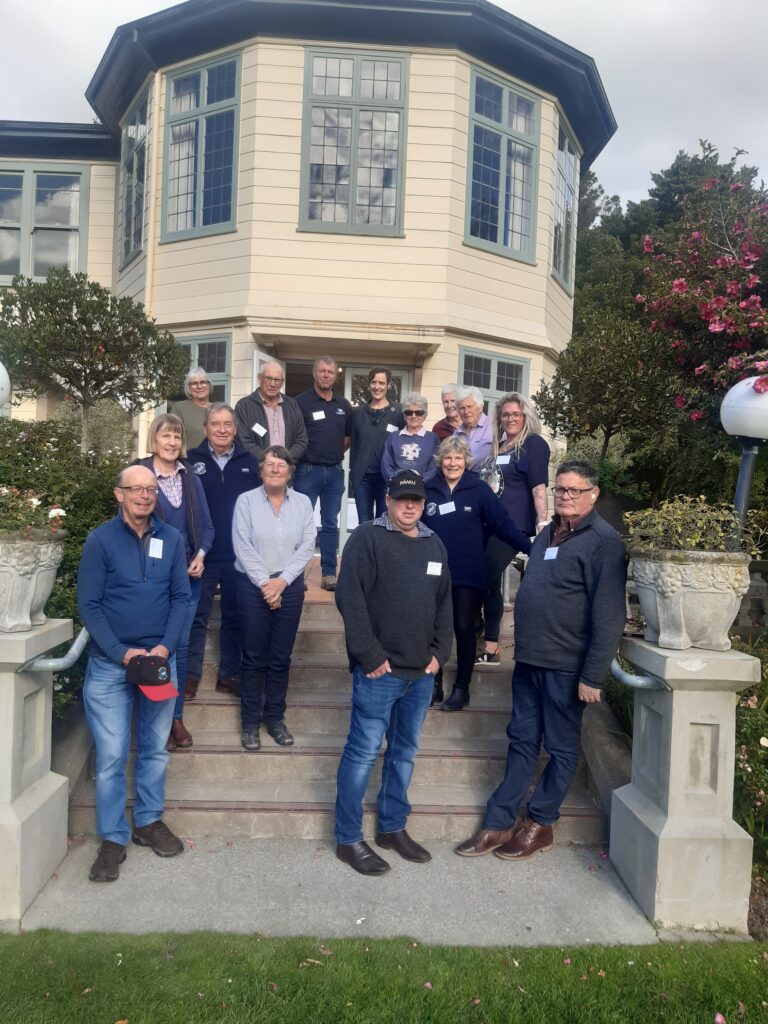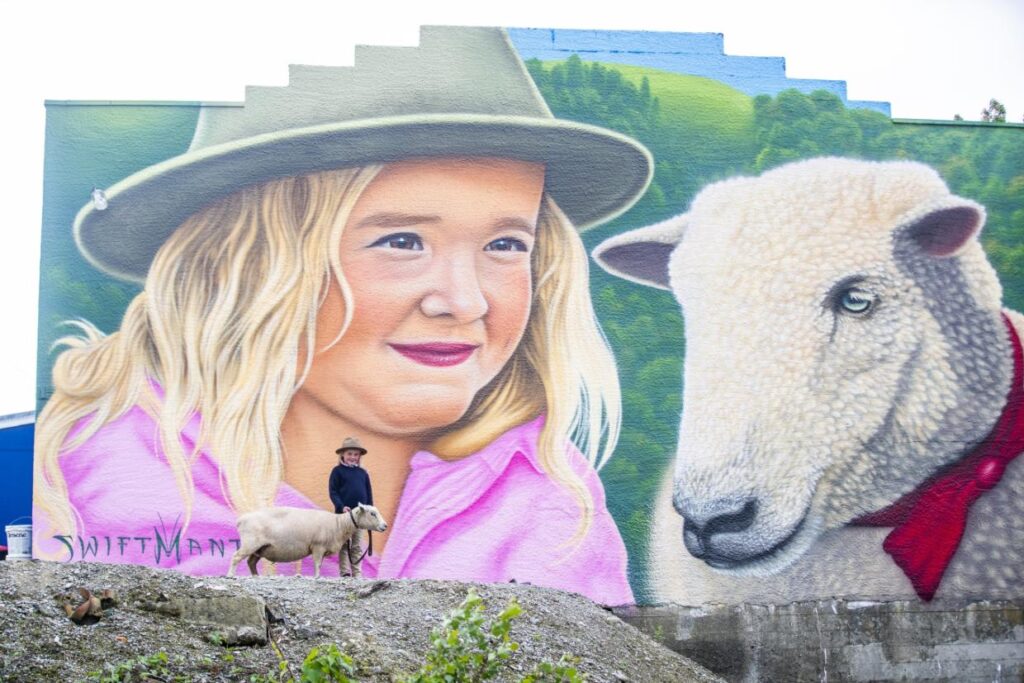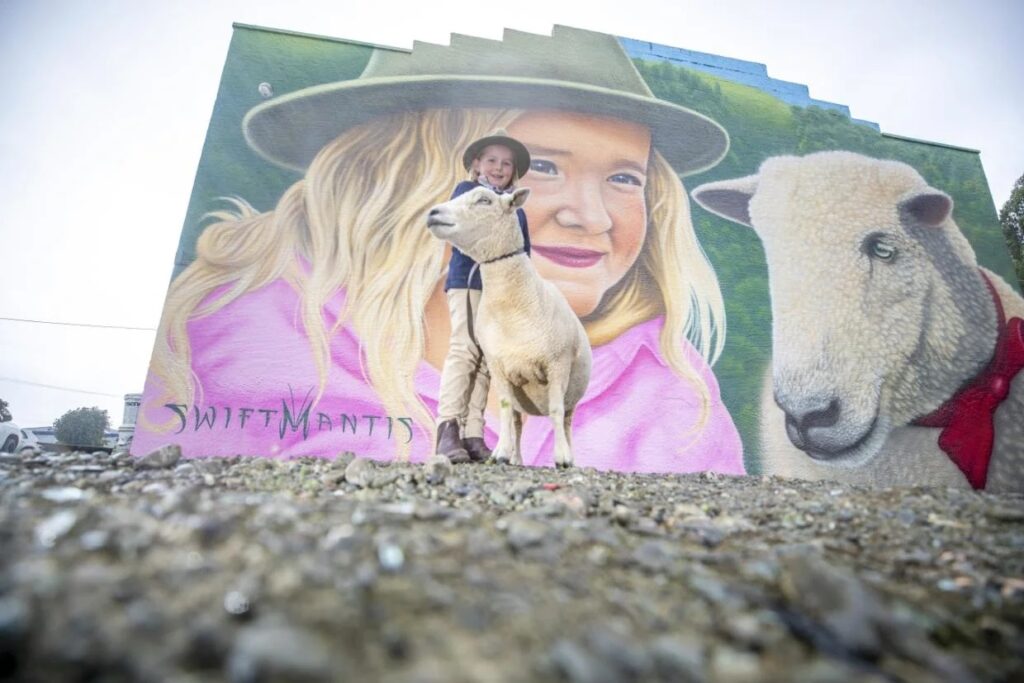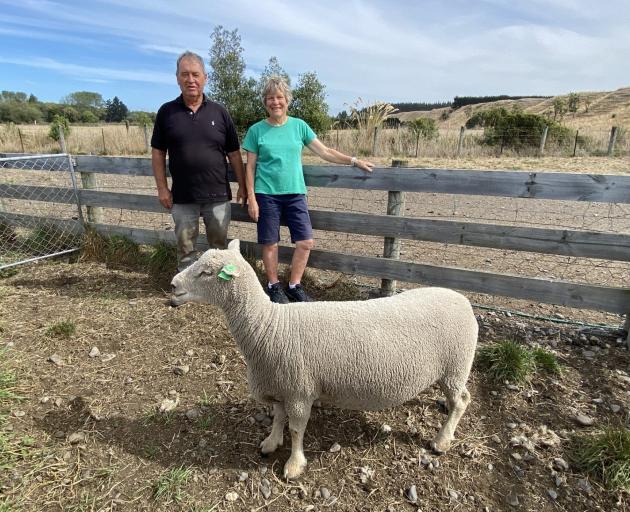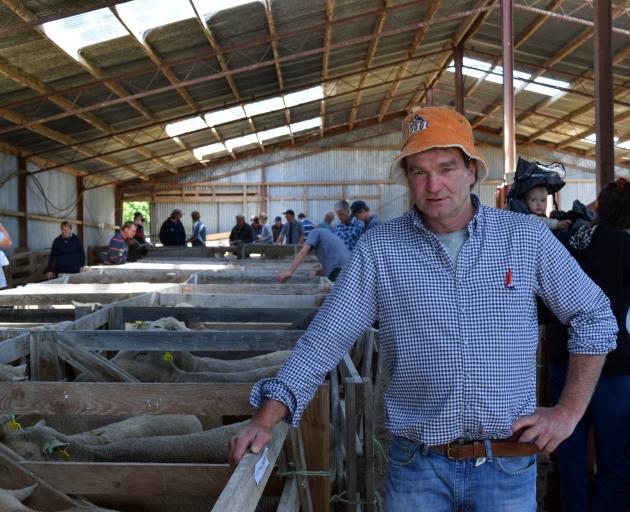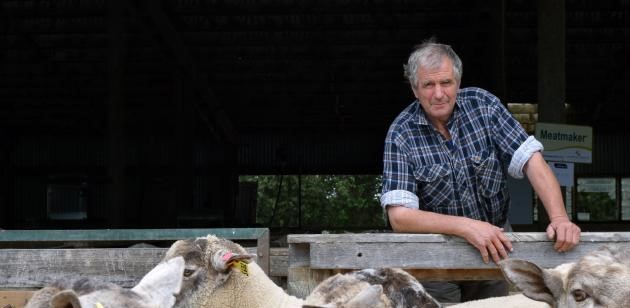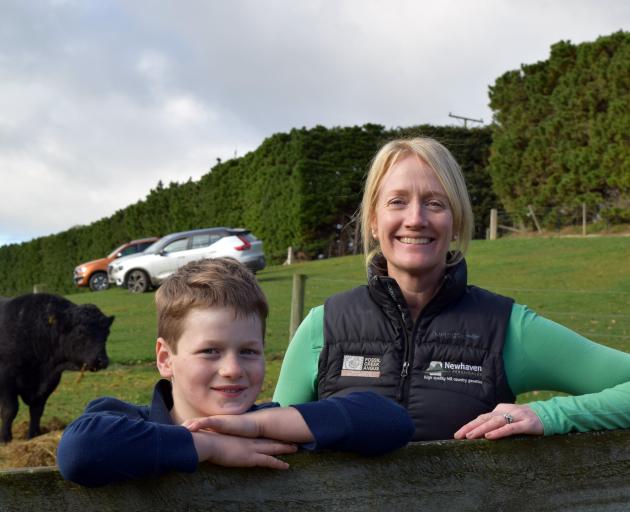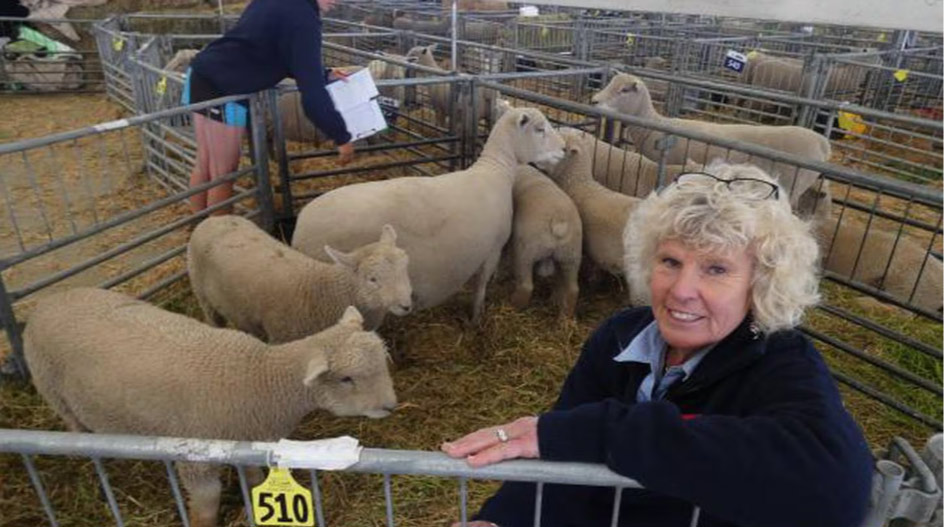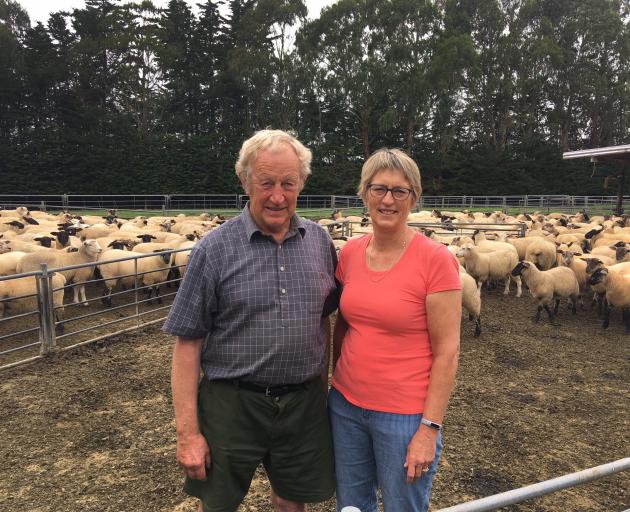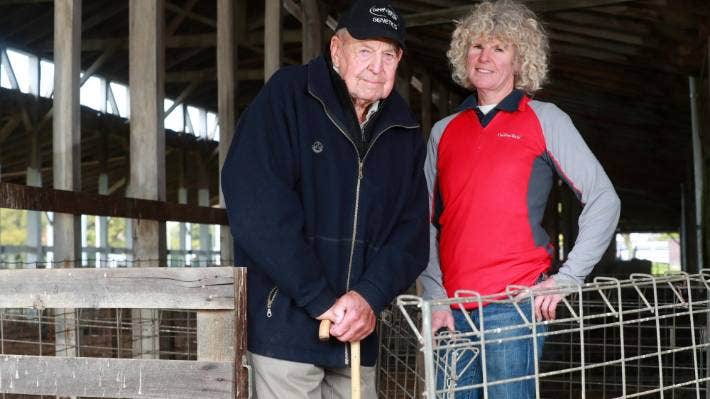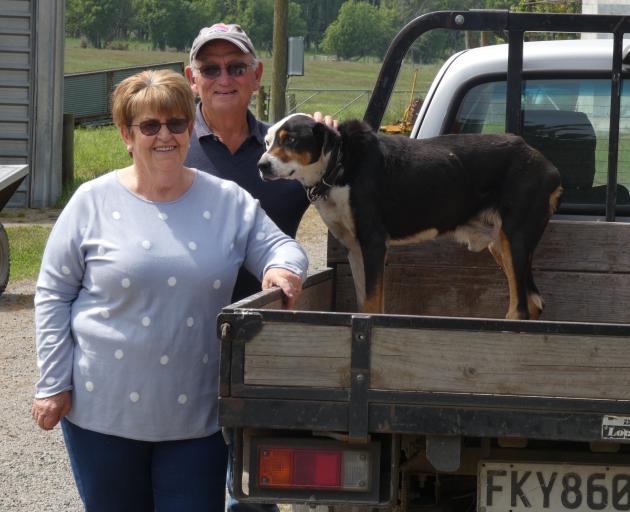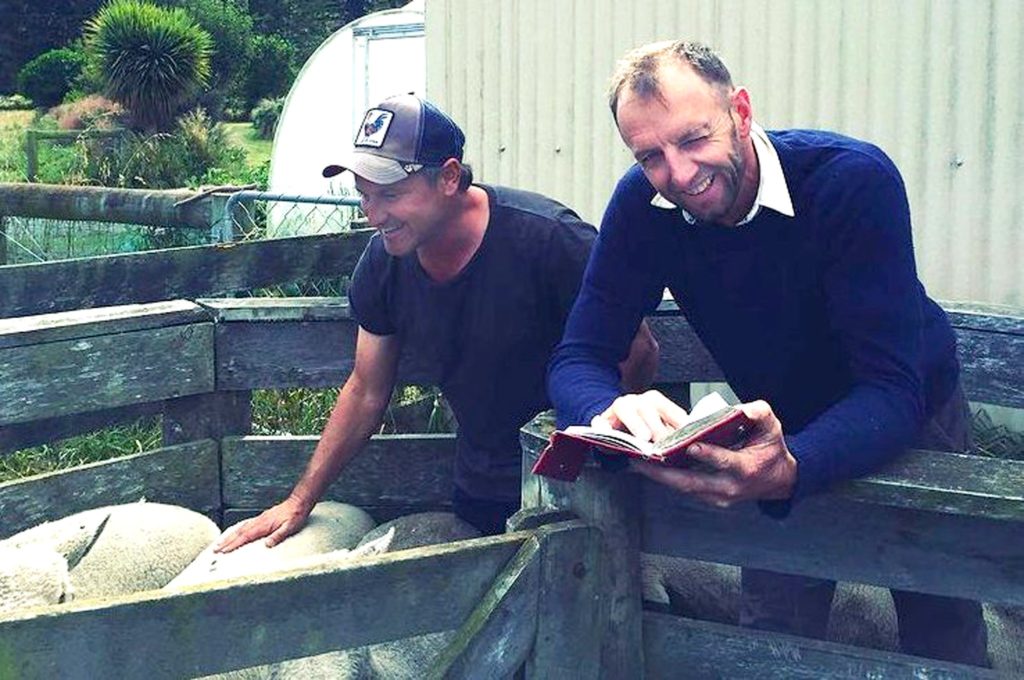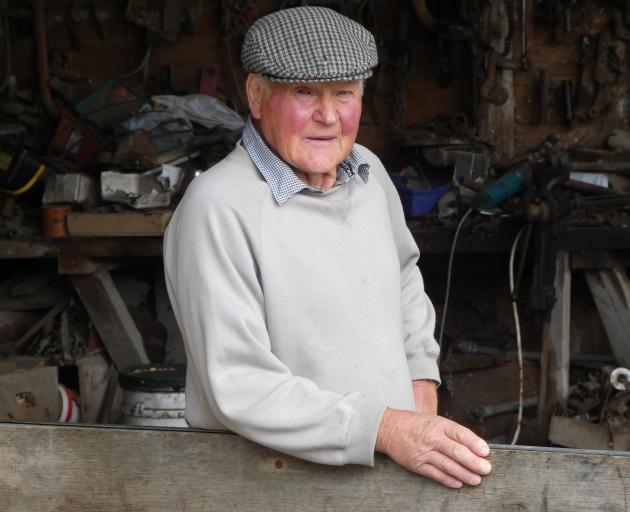
Southdown sheep breeder Neville Moorhead, 82, has gone through the ranks from being a sheep exhibitor, steward, convener, president, life member and patron at the Ellesmere A&P Show. PHOTO: TIM CRONSHAW
A Southbridge farmer whose great, great uncle competed at the Ellesmere A&P Association’s first show in 1871 is keeping the family legacy alive, writes Tim Cronshaw.
Neville Moorhead stretches easily over a fence before running a practiced eye over a small mob of Southdown rams to make his final cut.
The powerfully-framed stud sires cluster together before jostling to a corner of the front paddock at Holly Farm in Canterbury’s Southbridge.
It’s the day before the Ellesmere A&P Show and the 82-year-old, who turns over another year in December, shows no sign of nerves.
That’s to be expected from a veteran sheep exhibitor, who was in a pram for his first show and hasn’t missed one since.
The show’s honorary life member and patron can trace his family’s connection to the first event in 1871.
Staged in a borrowed paddock, a Moorhead was among the exhibitors.
“The first show ever held was in Southbridge township and one of the relatives, a great, great uncle, something like that, exhibited a pair of Clydesdales and was successful in winning with them. That’s where it came from and I suppose where I got a bit determined. You try to keep things going for as long as you can. It hasn’t been unbroken all the same.”
The 150-year link is a remarkable effort by one family.
His grandfather, Hugh Galpin, exhibited sheep with his uncle, Jack Galpin, as far as Timaru, travelling with their stock entries, mainly pigs. Larger pigs in crates were stacked from the bottom with lighter pigs in smaller crates on top and they would leave at about 2am for a day at the show.
Another grandfather, James Moorhead, achieved 50 years as steward in Ellesmere’s Jersey section.
His father, W.E. “Mac” Moorhead was president in 1960 and a patron and his brother, Murray, a class steward in the sheep section for 50 years.
Mr Moorhead said his family were keen stock people and it was only natural they wanted to exhibit animals.
“My mother lived up here and the family never had a car, but she used to exhibit sewing and cooking.
“She would ride the push bike down [eight kilometres] to the show in the morning with the basket in the front full of the cooking and that sort of thing.
“So there’s been that connection with the show for a long time. My family through the Galpins, Hurfords and the Moorheads have obviously been keen all the way through and keen on the stock breeding side so I guess that’s how it’s evolved.”
A competitive streak also explains the long run year-in and year-out.
Mr Moorhead is well past the 50-year mark. In his first year as the class steward in the Ryeland — an old English sheep breed — section he was probably 14 or 15-years-old and has been involved ever since. He was convener of the sheep committee a year after the show’s centenary in 1970 and carried this on for many years until becoming president for the 1988 show on a day of howling winds.
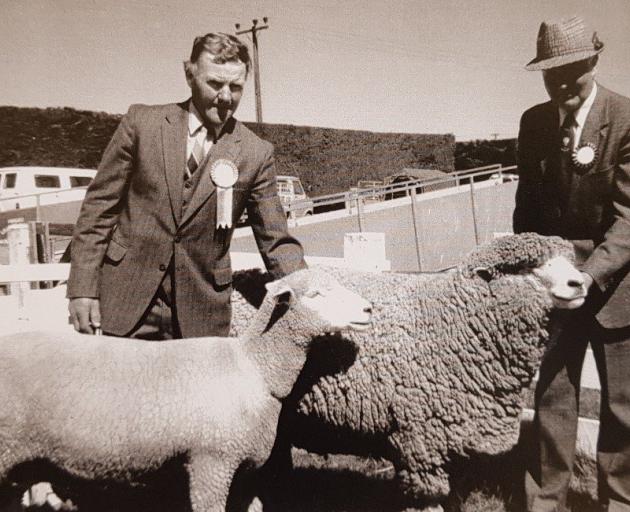
Neville Moorhead, left, with the champion Corriedale ewe and father Mac Moorhead with the champion Corriedale ram at the 1987 Ellesmere A&P Show. PHOTO: ELLESMERE A&P ASSOCIATION ARCHIVES
Four daughters exhibited pet lambs in their younger years before moving on from farming.
Today he still organises the stock judging for Young Farmers club members and his association with this organisation goes back to 1957.
The mixed-cropping farmer spent a lifetime growing processed peas, wheat, barley and white clover for seed on rich Paparoa silt loam soils in the district.
Southdowns and Corriedales played a large role in the mix. For many years they put Southdown rams to the Corriedale ewes for prime lambs.
The Southdown stud was established in 1935 by his father, and the Corriedales in 1957. The first Southdowns came from the nearby Oakleigh farm owned by Canterbury Seed Company when the flock was dispersed in 1945 and others from the Andrew family.
Mr Moorhead can remember helping drive the new Corriedale arrivals home from the now defunct Southbridge railway station. The Hawarden ewes had been transported by rail and got a chance to stretch their legs in the short journey to the family farm. The railway’s long gone, but the sheep are still there.
He broke away from his father at a young age to farm on his own in 1963, as a 22-year-old. Just over 160ha were leased for five years.
“I was pretty fortunate to have that opportunity to farm that. It was just down the road from the family farm and I tried to keep the stud work going down there, but it was a bit distant really.
“It was solely commercial and I had mixed cropping there again and I had 1000 ewes and a couple hundred hoggets. They were very good sheep too — Romney Merinos — and another indication of changing times was that prime lambs for the works one year made three pounds.”
That was good money and, once inflation is accounted for, more than he’s getting now.
After the four years elapsed, he bought a small block next to his father’s farm and has remained there since.
Part of the land across the road was his grandfather’s.
As he’s aged and the sheep “have got faster”, he’s leased some of the 114ha property to a neighbour across the road and more land to a farmer growing organic beans and potatoes.
Apart from the help of Frances Donald during lambing over the past nine years, he still runs the farm himself.
That’s left him with his stud sheep on a smaller working base with the cropping left to others.
“I’d rather be with the sheep to be quite honest. It’s just the love of animals I guess and breeding. It’s probably because I’ve had a big background since I was that big,” he said, reaching to the floor.
“My Galpin grandfather farmed Lymington, next door to Jo’s farm, on the Rakaia side of Holly Farm. They had several breeds of stud sheep and pigs. I was up at his place every weekend so I had a bit of background up there and then on the other side of the Hurford family they had Jersey cattle and pigs again so I had no choice, but I still had to enjoy it to carry on. I still enjoy trying to breed a slightly better one than last year.”
The Jo he’s referring to is Jo Jermyn Benny, author of the updated Ellesmere A&P Show history called Beyond the Show Gates.
Mr Moorhead’s story is one of many in the publication — just a bit longer than most — and the pair share the same bond for the show and have farming ties.
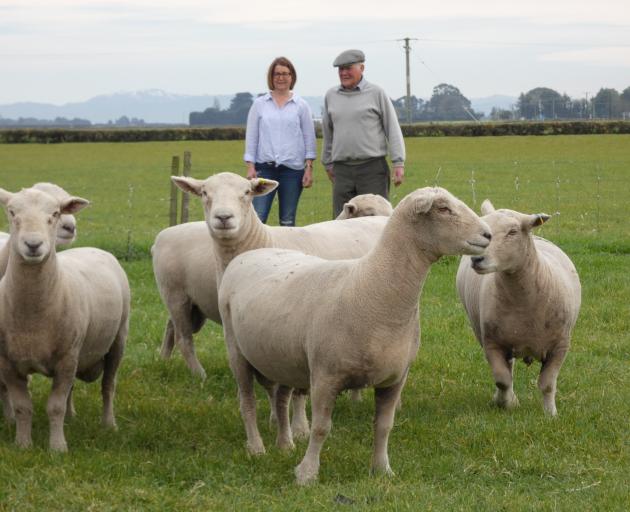
Southdown and Corriedale sheep breeder Neville Moorhead at Holly Farm in Canterbury’s Southbridge with Jo Jermyn Benny, author of an updated history of the Ellesmere A&P Show called Beyond the Show Gates. PHOTO: TIM CRONSHAW
The book updates two earlier editions of the show’s history to bring it up to speed.
Ms Jermyn Benny grew up in Marlborough on a sheep and cattle farm on the south side of Awatere Valley. Her husband, Andrew Benny, also has Marlborough connections, his mother growing up in the historic Langley Dale homestead, in Northbank, Wairau Valley, but he was raised in Canterbury.
They farm a mixed cropping and fine wool flock just up the road from Holly Farm, with the Benny family having farmed in the Southbridge district since the 1860s. In fact, the Benny family built the homestead on Holly Farm where Mr Moorhead lives now.
Ms Jermyn Benny visited the Ellesmere show while she was at Lincoln University, before marrying and moving to the district.
Their show link is also strong with Mr Benny on the A&P show committee since 2004 and was president over the challenging Covid-19 lockdown era.
Because of that he’s one of just three presidents to hold more than a one-year term. He was due to lead the show for its 150th anniversary in 2020 until it was postponed for the following year with attendance restricted to exhibitors to the disappointment of the community.
It was the first time the show was cancelled since 1942 during World War Two.
Ms Jermyn Benny has enjoyed researching the show’s history while updating events of the past 25 years. With the assistance of local historian Mike Noonan more stories and photographs were added to the accounts of earlier editions.
Records were lost to a 1906 fire which made it difficult to find early details, but there was no shortage of information more recently from monthly meetings and annual reports, she said.
Somewhat surprisingly, two conversation points have consistently raised their head.
“I’ve seen the early minutes and if you look right through from the 1900s to now the two key topics that keep coming up are traffic and toilets. Literally toilets are mentioned at almost at every meeting and the progression of facilities.
“Neville and I had a great day driving around at the showgrounds when we first started the project. He’s got a phenomenal memory for where buildings had been moved on sleds and the ring reconfigured and a lot of history that few people would have any idea about.”
Thousands of people turn up for the show, claimed to be the largest one-day A&P show in the South Island with the Mackenzie show also somewhere in this mix.
Mr Moorhead said the show had survived and grown because of a strong farming community and the rise of trade sites selling products over the years.
“There isn’t as many sheep in the district as there once was and the dairy has really taken off, but not at the expense of the stud breeding at the show. Some years ago there were many Jersey, Friesian and shorthorn studs in the district and they did exhibit at the show, whereas today there are very few of them.
“So, things have changed immensely and when you take where I am through to the Rakaia bridge thousands of sheep have gone out of that area to cattle and that’s one of the big changes I’ve seen.
“The cattle have dropped away at the show and pigs have dropped away. There are still a few sheep studs of various breeds in Ellesmere, but at their peak, goodness gracious, there would be one at nearly every road. That’s going back sometime, but shows you how numbers have dropped away.”
For all that, sheep entries have held up during show day, he said.
Ellesmere also receives about 1000 horse entries to keep the stock side strong.

Canterbury Southdown and Corriedale breeder Neville Moorhead was a six-year-old sitting on the ring pipe at the top of the showgrounds during the Ellesmere A&P Show’s grand parade in 1947. PHOTO: ELLESMERE A&P ASSOCIATION ARCHIVE
Mr Moorhead said long-established names of farming families remaining in the district had also created show loyalty.
Thumbing through a long list of presidents dating back to Reverend William Bluett in 1870, many of the same surnames crop up, as the next generation lines up for service.
The community-minded Moorheads have a long association with the local Anglican church with Mr Moorhead ringing the Sunday bell since he was 13-year-old.
Another tie that goes way back is his connection with the New Zealand Young Farmers Club and he was made a life member in 2014.
“With those three groups I sort of believe in joining and belonging to something and trying to attend it and do it well rather than belong to five or six organisations and send apologies to half of them. That’s just my attitude.”
He had 35 to 40 Lincoln University students at his farm recently, going through the fundamentals of sheep breeding and showing them the value of carcass conformation and other traits.
Some of them might go on to show sheep, while others would bank this knowledge when they bought their own stock, he said.
Over the course of decades of exhibiting sheep at Ellesmere he couldn’t count how many ribbons — many of them red — he’s won. Some of them are on the sideboard in the hallway and others stored in a bag.
Among many notable wins, a stand-out was a Southdown ram which went on from the Ellesmere show to become the champion sheep three years in a row at the Canterbury A&P Show in Christchurch about a decade ago. The ram won as a hogget, two tooth and four tooth and was a mainstay sire at the Holly Farm stud and there’s still 50 straws from him banked away.
Before that, another two champion ewes won their classes when the Southdown competitions were particularly strong at the Christchurch event.
Mr Moorhead had another good result in the sheep pens, winning several red ribbons at the Ellesmere A&P Show on October 14 in strong winds unseen since he was president of the 1988 event.
A silver cigarette case presented to him at a centenary show and a sugar bowl are prized possessions.
Ms Jermyn Benny said Mr Moorhead’s show longevity would take some beating.
“There’s not that many around that have that connection and kept it up. Neville is an active A&P person and I can’t think of anybody that would embody that A&P movement more than him. The fact that Neville was racing around the other day trying to find stock judges for the Young Farmers competition at the Ellesmere show just shows his commitment.”
Close to the front of the book is a photograph of the grand parade with men dressed in suits and women in hats and their finest dresses. Behind them are 1920s, 1930s and 1940s cars in neat rows.
As the horses and calves marched past the crowd a young Mr Moorhead, only 6 at the time, was sitting on the ring pipe at the top of the showgrounds watching the parade in about 1947.
The memory of those animals going past remains with him like yesterday.
He can’t imagine ever stopping showing.
“I will keep going for as long as I can. I don’t know how long it will be, but I’m still keen.”

